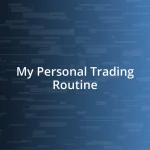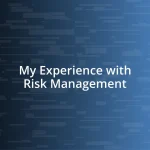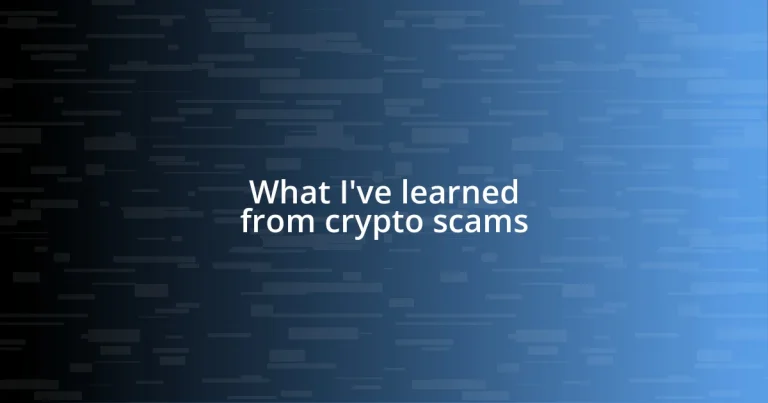Key takeaways:
- Be skeptical of “too-good-to-be-true” offers, as they often exploit emotions and lead to scams.
- Recognize warning signs such as lack of credibility, unsolicited offers, and pressure tactics to avoid falling victim to scams.
- Reporting scams and sharing personal experiences can help raise awareness and protect others within the community.
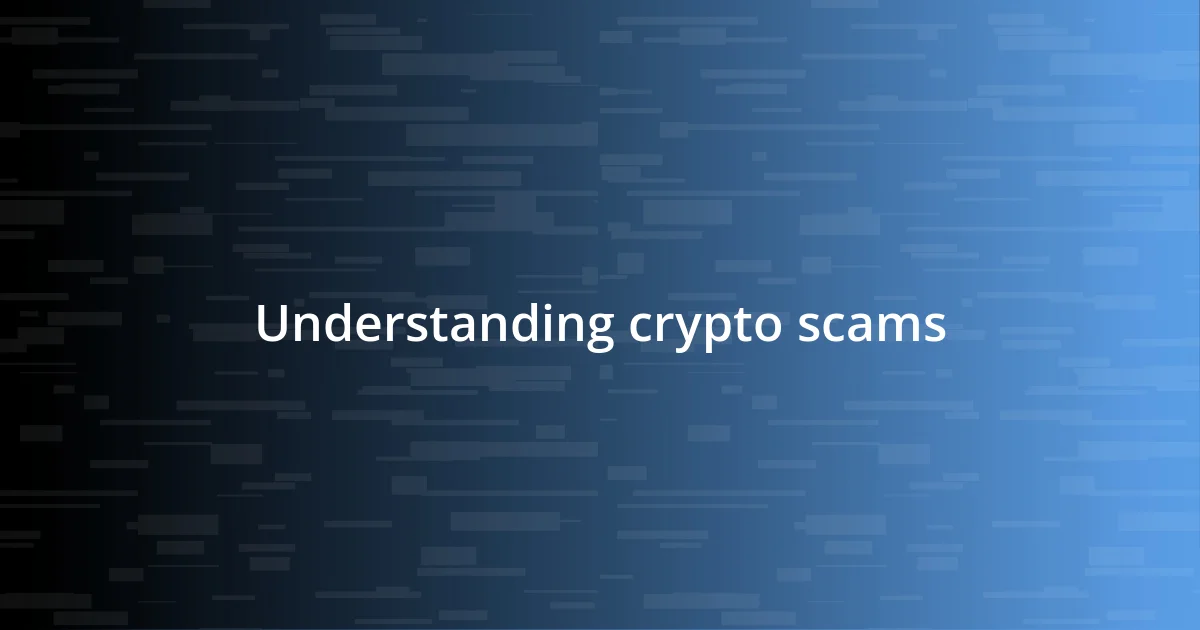
Understanding crypto scams
Understanding crypto scams can feel overwhelming, especially when the landscape is constantly changing. I remember the first time I stumbled upon a “too-good-to-be-true” investment opportunity in crypto. Like many, I was lured in by flashy websites and promises of guaranteed returns, but it quickly turned into a lesson I won’t soon forget.
What strikes me most about these scams is their ability to exploit human emotions, particularly our hopes and fears. Have you ever felt the rush of excitement when you think you’ve found the next big thing? That euphoria can cloud judgment, leading to impulsive decisions. I’ve had friends who dove into projects based solely on hype, only to discover they were fronts for scams. It’s a stark reminder that in the crypto world, skepticism can actually be your best friend.
Navigating this digital realm isn’t just about understanding technology; it’s about recognizing the psychological tactics scammers use to manipulate us. I’ve learned that many scams are designed around our desire for quick wealth and validation. Engaging with the community, asking questions, and being aware of red flags—like overly aggressive marketing and lack of transparency—are crucial steps to safeguard against falling victim to these schemes.
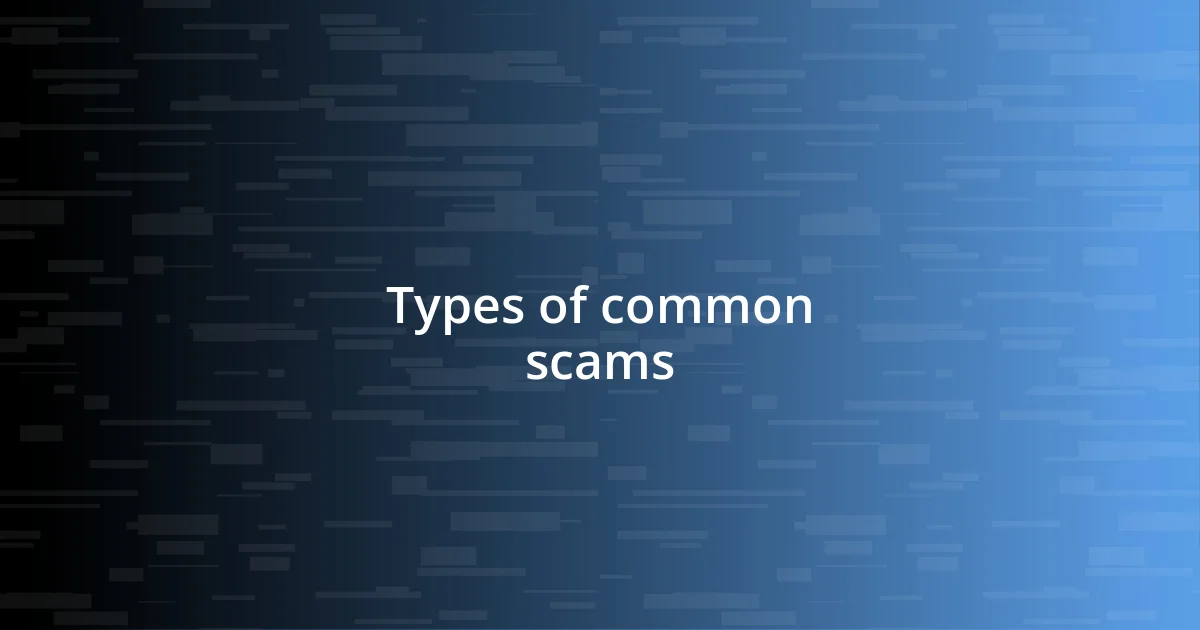
Types of common scams
One common type of crypto scam that I’ve encountered is the Ponzi scheme. In my early days in the crypto space, I was approached by someone boasting about a slick platform that promised unusually high returns. I remember feeling excited, only to later learn that the returns were paid out using the investments of newer participants rather than actual profits. Here are some types of Ponzi schemes I’ve seen:
- Promises of guaranteed returns with little to no risk
- Investments marketed through social media influencers
- Complex structures that are hard to trace or understand
Another prevalent scam is the phishing attack. I can’t emphasize enough how deceptive these attempts can be. I once received an email that appeared to be from a well-known exchange, prompting me to verify my account. It wasn’t until I had a close friend, who’s experienced in cyber security, warn me that I realized it was a scam designed to steal my information. These scams can take various forms, including:
- Fake emails or messages resembling legitimate companies
- Websites that mimic official platforms
- Links urging users to enter private keys or passwords
I’ve learned that staying informed and cautious can make a significant difference in avoiding these pitfalls.
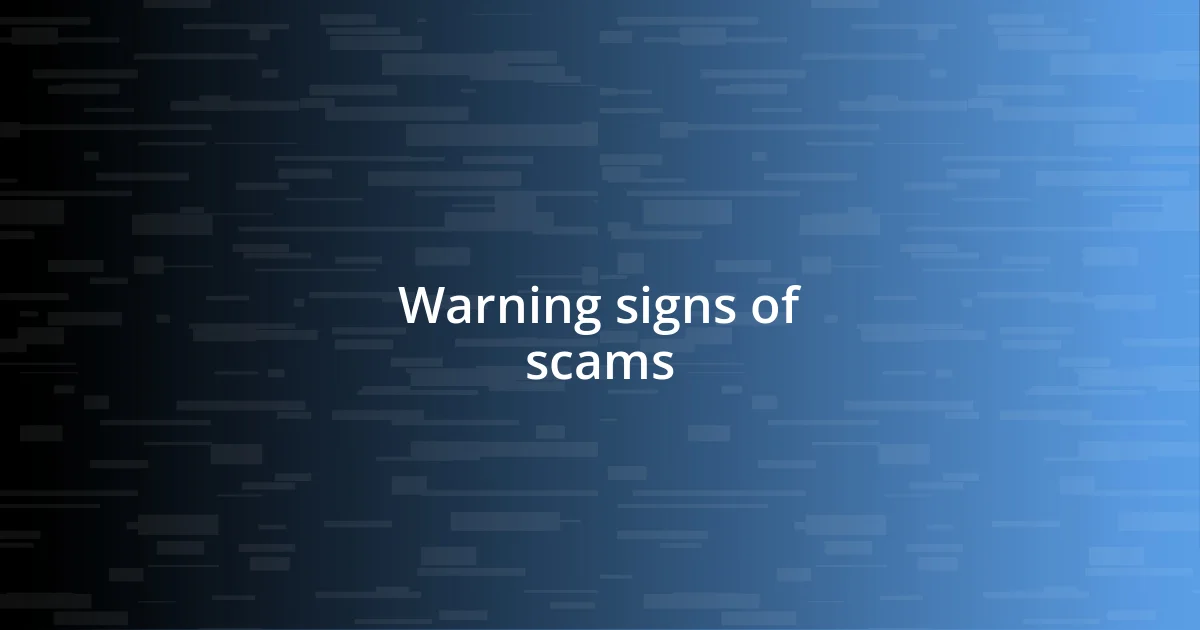
Warning signs of scams
It’s essential to be attuned to the subtle warning signs that hint at potential scams. One major red flag I’ve noticed is the lack of credible information. I remember encountering a project that had little to no online presence outside of its website. This gave me pause; a credible project usually has a well-established community and transparent details. If you’re struggling to find any reviews or real discussions about a platform, it’s time to tread cautiously.
Another common warning sign is unsolicited offers. I once received a random message from someone claiming they could turn my small investment into a fortune overnight. It felt too easy, pushing me to dig deeper. Often, scammers spin intricate stories around their offerings, making them sound irresistible. If you ever find yourself in such a situation, take a step back. The best opportunities come through research, not impulsive reactions to unexpected messages.
I also advise fellow crypto enthusiasts to watch for pressure tactics. A friend of mine was once pushed to invest quickly because ‘the opportunity would vanish soon.’ This kind of urgency should raise alarms. Legitimate investments allow you time to think things through. If they’re trying to rush you in, it’s likely a sign of foul play.
| Warning Signs | Description |
|---|---|
| Lack of Credibility | Inadequate online presence and absence of community support. |
| Unsolicited Offers | Unexpected messages promising quick wealth or exclusive deals. |
| Pressure Tactics | Urgency to invest without giving you time to consider. |
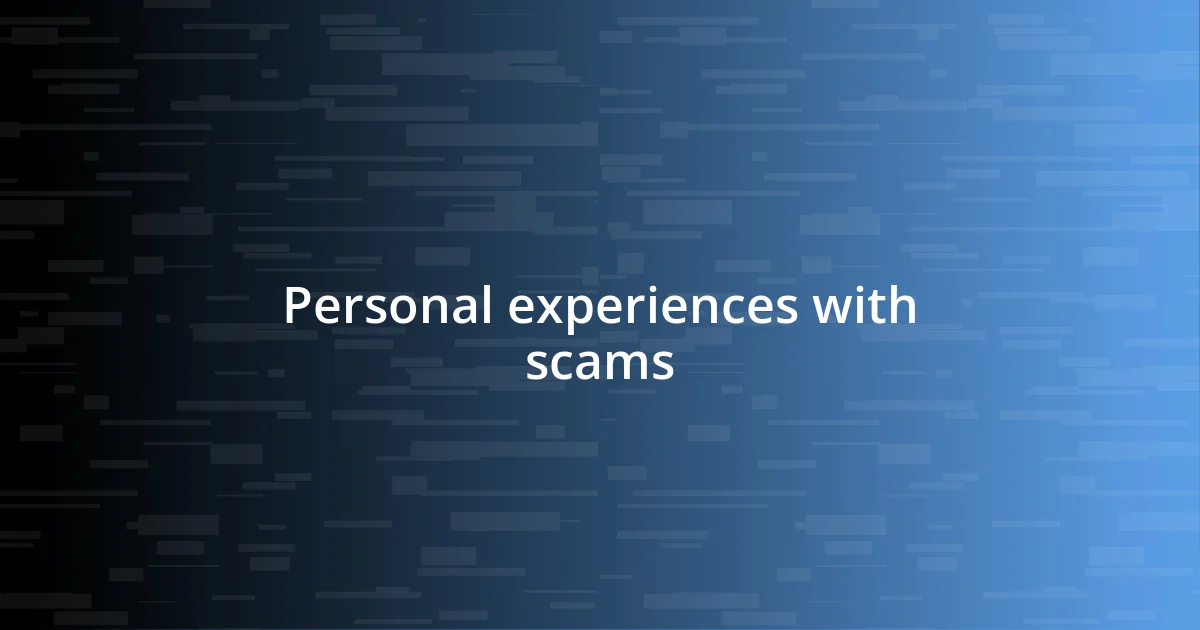
Personal experiences with scams
I once found myself in a situation where I was convinced to invest in a new cryptocurrency that seemed promising. The person who introduced it to me was so charismatic; they really painted this vibrant picture of lots of potential. It felt exhilarating, but now I look back and wonder how I overlooked the fact that there was zero real-world use behind the coin. It was a harsh lesson that sometimes charm can disguise a heap of red flags.
Another incident that sticks with me was when I almost clicked on a link in an alluring message that teased about exclusive access to a trading platform. My heart raced, visions of profit danced in my mind, but thankfully, something told me to pause. That moment of hesitation saved me from clicking a link that could have led me straight into a phishing trap. It’s funny how one instinct can change the course of what could have been a costly mistake.
On a different occasion, I was lured into a fake investment group that promised insider trading tips. It felt like I was in on a secret at first, but then I started noticing how the conversation was all about getting more people to join rather than actually trading. I started feeling uneasy. How had I gotten caught in a web of empty promises? That experience taught me a crucial lesson: if an opportunity feels more about recruiting than real value, it’s time to reassess where you’re investing your time and trust.
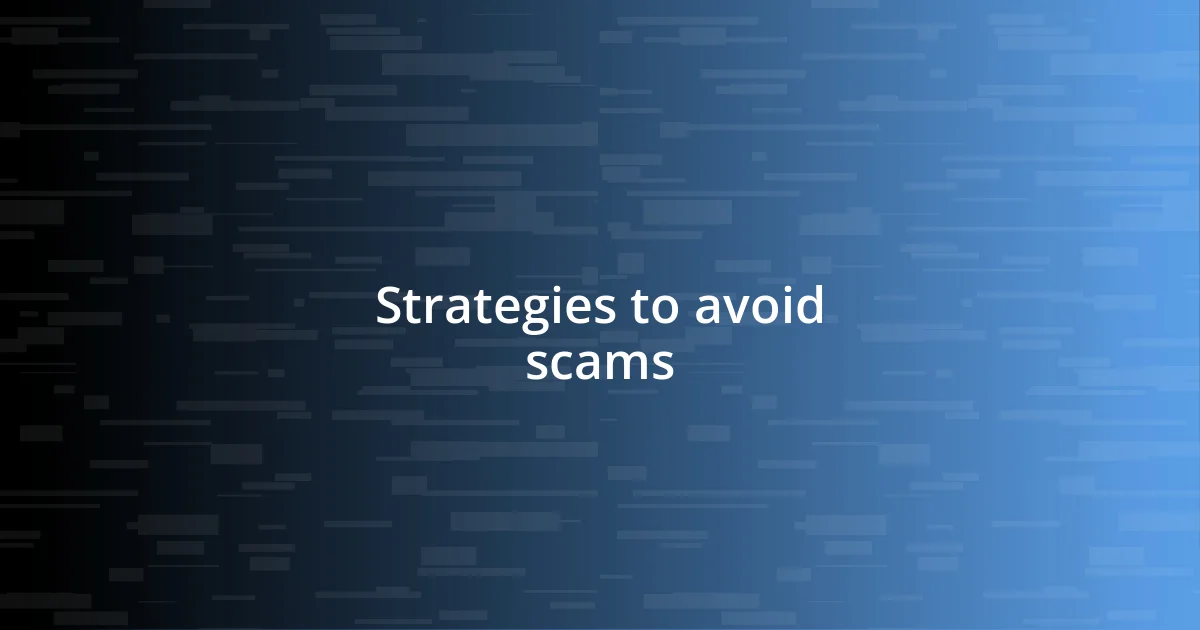
Strategies to avoid scams
When it comes to evading scams, one of the strategies I’ve adopted is to conduct thorough research before diving into any investment. I recall a time I was tempted by a shiny new token that boasted massive returns. Instead of jumping in, I spent a few hours scouring forums, looking for solid discussions and legitimate reviews. That extra effort not only saved me money but also opened my eyes to the importance of community validation. Have you ever done a bit of digging and unearthed crucial information that changed your mind? It’s a game-changer.
Another important strategy is to safeguard your personal information. I remember a close friend who casually shared their phone number on a so-called “exclusive” investment website, believing it was harmless. Before they knew it, they were bombarded with spam messages and calls trying to lure them into fraudulent schemes. So, I always emphasize being stingy with your personal details. Protecting your identity can make a world of difference. Would you hand over the keys to your house to a stranger? Probably not, right?
Lastly, I’ve found that utilizing two-factor authentication (2FA) can add a vital layer of protection to your accounts. There was a period when I felt frustrated by all the hoops to jump through, but when I set up 2FA on my wallet, it gave me an unexpected peace of mind. The extra step felt tedious at first, but it transformed my online security. I can’t stress enough how that little effort can be the difference between being secure and falling victim to a scam. How secure do you feel about your digital assets? Sometimes, a tiny adjustment can lead to significant security improvements.
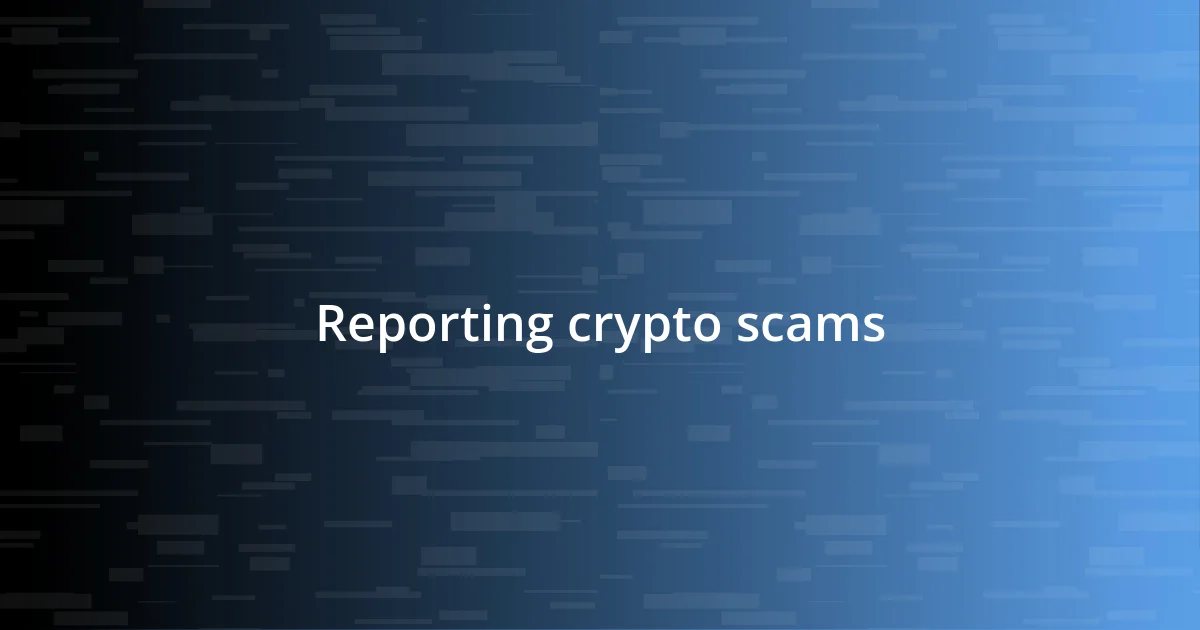
Reporting crypto scams
Reporting a crypto scam can feel like navigating a maze of frustration and disbelief. I remember when I finally mustered the courage to report a suspicious platform that had contacted me. The moment I clicked “submit” on the report form, a strange mix of relief and anger washed over me. It was cathartic, but I couldn’t shake the unease of knowing that others might still fall victim to it. Have you ever felt that urgency to speak out, hoping to protect someone else?
The process itself can sometimes feel daunting, especially if you’re unsure where to start. I once found myself staring at multiple government websites, trying to determine which agency was the right one for reporting a crypto scam. Each site offered a mix of information, and I ended up overwhelmed. It struck me then how lacking the guidance can be, and it made me wish more resources were easily accessible. When you’re in the moment, clarity can be your best friend—so always take a deep breath and make sure you’re following the right path.
After successfully reporting a scam, I learned the importance of spreading awareness within my own circles. I decided to share my experience with friends and family, using my story as a cautionary tale. Have you considered leveraging your personal experiences to educate those around you? It can make a real difference, as talking openly about these issues transforms fear into knowledge. Awareness is a powerful tool against scams.

Lessons learned from scams
One of the most impactful lessons I learned from crypto scams is the significance of skepticism. I remember a colleague excitedly pitching an investment opportunity that promised unrealistic returns. Instead of expressing my doubts, I nodded along, only to later find out it was a complete scam. Reflecting on that moment, I realized that a healthy dose of skepticism can be your best ally. Have you ever found yourself swept up in excitement, only to later wish you’d paused to think critically?
Another key insight revolves around the necessity of continuous education. I stumbled upon a YouTube channel dedicated to dissecting current scams and fraud tactics. Initially, I thought I didn’t need it, but after a few fascinating episodes, I found myself more informed and aware. Understanding how scammers operate can make a difference. It’s like having an umbrella on a rainy day—you might not see the storm coming, but you’ll be much better off when it hits. Have you taken the time to educate yourself about potential threats?
Finally, I’ve come to value the importance of community support. After sharing my scam experience online, I was amazed at how many other people reached out with similar stories. This created a sense of camaraderie and empowerment, as we collectively worked to spread awareness. Through this connection, I understood that we’re not alone in this battle against scams; sharing our stories can create a ripple effect of protection. How often do you engage with communities that share your interests? Those relationships can be invaluable in navigating the sometimes treacherous waters of the crypto world.





